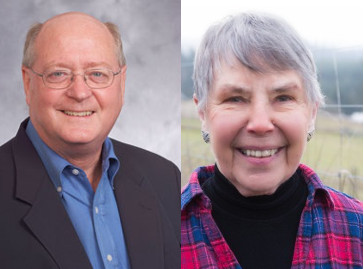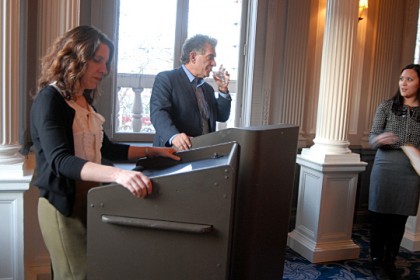
light-rail advocate Elizabeth Furse.
(Photos from campaign websites)
The cultural divide between Portland’s increasingly low-car-friendly inner suburban voters and its more auto-oriented exurban voters was visible in many of last night’s elections.
In Milwaukie, an inner Southeast suburb that a few years ago was locked in a battle over light rail, about 54 percent of voters turned down a chance for a protest vote. They also helped send their relatively liberal former mayor, who pushed light rail through, back to a seat on the conservative Clackamas County Commission.
Paul Savas, a moderate conservative on the Clackamas County board, also narrowly turned back a challenge from a conservative Lake Oswego city councilwoman who called him a light-rail lover.
In Washington County, bike lane and sidewalk fan Greg Malinowski was returned to office by 69 percent of voters his northeast Beaverton district. But further west, the vocally bike-skeptical and sometimes factually challenged Bob Terry defeated urban growth boundary advocate and former Congresswoman Elizabeth Furse with 52 percent of the county’s vast western district.
Washington County Chair Andy Duyck, who had (along with the county’s homebuilding industry) aligned with Terry and against Malinowski, thumped his own challenger in a countywide vote to ensure a continued majority in Washington County’s leadership for expanding the urban growth boundary to make room for more suburban housing.

Kafoury, left, will become executive chair of the agency
that runs most of Portland’s bridges.
(Photo by M.Andersen/BikePortland)
Meanwhile in Multnomah County, the Bike Walk Vote-endorsed Deborah Kafoury soundly defeated former Portland city councilman Jim Francesconi, 66 percent to 18 percent, in a race to run an office that mostly concerns social services but also controls the Sellwood, Hawthorne, Morrison, Burnside, Broadway and Sauvie Island bridges.
Kafoury, who mentioned in February that she recently began bike commuting, predicts that someday (though probably not on her watch) all the bridges will be tolled.
On Portland City Council, incumbents Nick Fish and Dan Saltzman easily won reelection, with 73 percent and 64 percent of the vote respectively. Saltzman’s vocally pro-bike challenger Nick Caleb was taking 17 percent of the vote.
A Portland ballot issue that would have removed sewers, waters and stormwater drainage from city oversight, and might have created a new obstacle to combination storm drainage/traffic-calming projects, was rejected by 72 percent of voters.
In the state legislature, Speaker Tina Kotek (D-North Portland) was one of many Portland-area incumbents who defeated challengers or won uncontested races. Gov. John Kitzhaber also thumped a token opponent in the Democratic primary with 89 percent of the vote, setting up a fall race against state Rep. Dennis Richardson.
With no directly bike-related questions on the ballot or at the heart of local politics, and Portland Transportation Commissioner Steve Novick partway through his first term, it was in many ways an off-election for local bicycle issues in particular. In an interview on Tuesday, Bicycle Transportation Alliance Executive Director Rob Sadowsky said his organization is weighing its options for moving more deeply into electoral politics against the need to dedicate its time to lobbying around a major state transportation bill expected in 2015.
“We’re looking at everything from voter registration to potentially creating a new 501(c)4 entity that would allow us to endorse more qualified candidates,” Sadowsky said.

